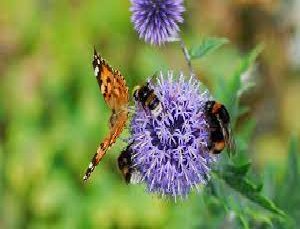Abating Insect Population May Detector ‘ Plant Wars, ’ Research Shows

For a while now, terrain scientists and wildlife experts have advised us about abating nonentity populations. A review published in April 2019 in the journal Biological Conservation had advised about drastic cascade in their figures, claiming that over to 40 of nonentity species in the world were on the verge of extermination. Experts have noted that nonentity demolitions at such a massive rate will be disastrous for the ecosystem. It would leave multitudinous catcalls, reptiles, amphibians, and indeed mammals out of their primary diets, ultimately performing in them starving to their deaths.
But it’s not just creatures declining nonentity figures may also spell doom for factory populations. Insects play a vital role in pollination — so important so that shops go to great extents to attract bugs, notions, and flies that are necessary for their reduplication. piecemeal from offering quencher, shops also bait insects by producing remarkably strong smells, and some may indeed disguise themselves as potential mates for their pollinating population. All of this indicates just how vital a position insects enthrall in the reproductive process of shops. A new paper now suggests that as nonentity populations continue to fall,inter-species “ violence ” among shops could be a possible consequence of the drop.
Published in Nature, the exploration reports the findings of field trials in Switzerland conducted by biologists Christopher Johnson, Proneet Dutt, and JohnathanM. Levine. The scientists carried out their tests on 102 plots of2.25 square measures, conforming of five flowery factory species — field mustard, sludge gromwell, common poppy, sludge flower, and wild fennel — native to Switzerland. In some of these plots, the experimenters controlled pollination by hand. In some other plots, the shops were made to calculate on normal environmental situations of pollination. Some others were enclosed, and half of them were open to only one of the pollinator species. The rest of the enclosed plots were exposed to an terrain that would stimulate pollinator decline.

The scientists set up that in 90 of those enclosures, the competition for pollinators destabilizedinter-plant species relations, and latterly reduced the proportion of dyads of shops anticipated to attend. Experimenters noticed that niche differences the difference in processes among species in how they use a niche that would allow them to attend was disbalanced and destabilized in the absence of enough pollinators.
In other words, the capability to attend with other factory species lowered among all those included in the trial. This indicates that when faced with a failure of pollinators, every factory fights solely for itself, and will contend with other factory species to vie for attention from the limited number of insects mooching around the ecosystem. also, as shops begin to contend with each other for attention from only a sprinkle of insects, those species with lower pollinator visits will also face a decline in their population.
The scientists did note that since the study was done on a small scale and in a limited time- frame, there remains a possibility of factory species arriving at a new concurrence balance in the future, over a longer frame of time. still, they emphasized that findings from the trials remained concerning nevertheless.
This study serves as a timely memorial of the critical need to address the growing decline in nonentity populations around the world. Humans may not suppose of insects as further than a imminence or nuisance, but they easily fill important shoes in the ecosystem, and it's important to save them from brewing extermination. A mass nonentity extermination will spark a chain of other events among the biodiversity of the world, including driving indeed shops to violence with each other, as the present study shows. Human activities similar as husbandry practices( including the use of fungicides and other poisonous chemicals), are one of the major motorists of nonentity decline. It also becomes our responsibility towards the ecosystem to legislate way to alleviate this.



No comments:
Post a Comment